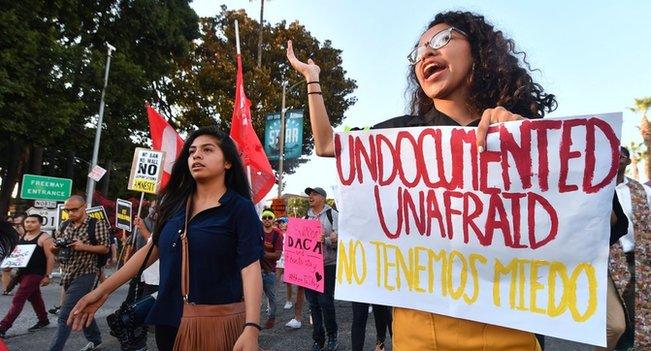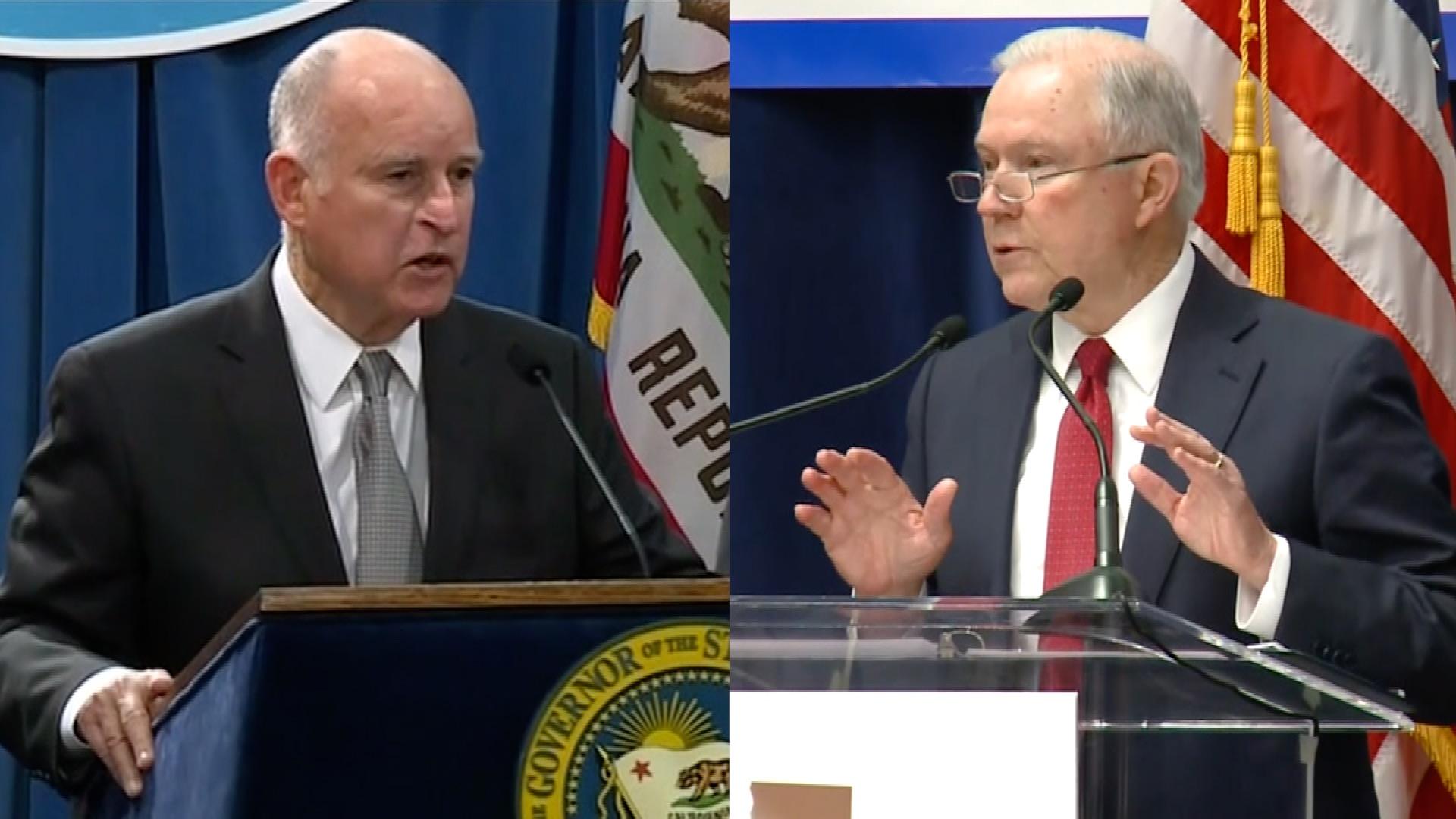California governor lashes out over immigration lawsuit
- Published
Jerry Brown v Jeff Sessions: 'This is war against California'
California's governor has accused the US Department of Justice of waging war after it filed a lawsuit against the state over its immigration policies.
Governor Jerry Brown's remarks came an hour after US Attorney General Jeff Sessions attacked the state's "open borders" in a speech in Sacramento.
The department filed a lawsuit over the state's "sanctuary" laws that protect illegal immigrants from deportation.
Mr Brown accused Mr Sessions of lying to appease President Donald Trump.
"Like so many in the Trump administration, this attorney general has no regard for the truth," Governor Brown told reporters, arguing the state's laws were created with input and support from California law enforcement.
"This is basically going to war against the state of California."
Mr Sessions had earlier addressed a group of law enforcement officials in the state's capital city a day after he filed a lawsuit over three of California's laws regarding "sanctuary" policies, which curb co-operation with federal immigration authorities.
"California absolutely, it appears to me, is using every power it has - powers it doesn't have - to frustrate federal law enforcement," the top law enforcement official said on Wednesday.
"So you can be sure I'm going to use every power I have to stop them."
The missing - consequences of Trump's immigration crackdown
He also repeated his criticism of the mayor of Oakland, California, who tipped off undocumented immigrants to an upcoming raid last month.
Mayor Libby Schaaf has defended her warning ahead of the raid while the White House called her actions "outrageous".
"How dare you needlessly endanger the lives of law enforcement just to promote your radical open borders agenda?" Mr Sessions said of the mayor on Wednesday.
The justice department named the state of California, Governor Jerry Brown and California Attorney General Xavier Becerra in the lawsuit filed in federal court in Sacramento on Tuesday.
California passed a law in October that bars police from asking residents about their immigration status.
Mr Sessions contends the laws prevent US Immigration and Customs Enforcement (ICE) agents from carrying out federal law and doing their job.
It is the first legal action against a municipality over its immigration policies by Mr Sessions' justice department.
Where do America's undocumented immigrants live?
The justice department has threatened to cut off funding to jurisdictions that resist its policies.
Both Mr Sessions and Mr Trump have blamed crime and gang violence on "sanctuary laws" protecting immigrants.
In the first month of his presidency, Mr Trump signed an executive order to revoke federal grant money from so-called "sanctuary cities" which refuse to deport undocumented immigrants.
Judges in Chicago, San Francisco, and other cities, have blocked the order.
More than 200 companies are believed to have submitted designs for the proposed border wall.
Several other states including Colorado, Illinois, New Mexico, Oregon and Vermont have "sanctuary laws", according to the Center for Immigration Studies.
Also on Wednesday the White House announced Mr Trump will visit California next week to inspect prototypes for the proposed US-Mexico border wall and attend a Republican fundraiser.
Mr Trump has yet to visit California since taking office and is the first president since Dwight Eisenhower to skip a visit during his first year in office, according to the Los Angeles Times.


What is a 'sanctuary city'?
The term applies to cities in the US that have policies to limit the assistance given to federal immigration authorities
Officials in those areas, including local law enforcement, are not allowed to enquire as to an individual's immigration status in the course of their duties
It is not a legal term so the way it is implemented can vary, but the policies can be set in law or just part of local policing practices
The idea got traction in the 1980s after Los Angeles told its police force to stop questioning people solely to determine their immigration status, in a bid to encourage immigrant communities to work with police
More than 400 jurisdictions across the US, including New York, San Francisco, Boston, Chicago and Seattle, have enacted policies protecting undocumented immigrants
Critics say these policies undermine federal law enforcement efforts and encourage illegal immigration
- Published31 August 2017

- Published7 March 2018
